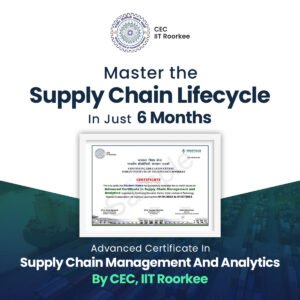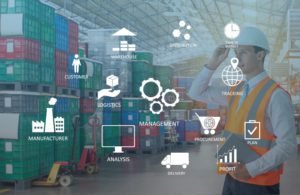In today’s dynamic business world, supply chain analytics plays a vital role in assisting organisations in making informed decisions, optimising their supply networks, and gaining the upper hand over their competitors.
Whether you are a supply chain professional looking to advance your career or an aspiring analyst looking for an introduction into supply chain analytics, enrolling in a top-tier supply chain analytics course can give you the knowledge and expertise you need to succeed.
This blog will look at some of the best supply chain analytics courses to watch out for in 2023.
Introduction into supply chain analytics
Supply chain analytics is critical in enhancing supply chain management, operations, and efficiency by employing data analytics methodology and tools. It entails analysing massive amounts of data modern supply chains produce to obtain insights, identify trends, and address shortcomings. The introduction of computer-based technologies, such as artificial intelligence (AI) and machine learning (ML), has dramatically improved supply chain analytics in recent years.
Best supply chain analytics courses

Pursuing a supply chain analytics course can help expand your expertise and contribute to better decision-making, and drive efficiency in supply chain operations. Here are some of the top courses you can consider:
-
Supply Chain Analytics: Rutgers the State University of New Jersey
Offered by Rutgers University, this comprehensive course focuses on supply chain analytics and equips learners with the necessary skills to generate actionable insights for effective decision-making. It covers data-driven decision-making, demand forecasting, inventory management, and optimisation techniques. Through hands-on exercises and real-world case studies, students gain practical experience in applying analytics to supply chain scenarios.
Duration: 5 months approximately
Fees: N/A
-
RA: Data Science and Supply Chain Analytics (A-Z with R) by Udemy
This course on Udemy provides a comprehensive overview of data science and supply chain analytics using the R programming language. With a focus on practical applications, this course empowers learners to analyse supply chain data and extract valuable insights. Students will learn to leverage data science techniques for supply chain optimisation, inventory management, forecasting, and revenue management.
-
Professional Certification in Supply Chain Management & Analytics by Imarticus Learning
Designed in collaboration with IIT Roorkee, the course covers supply chain performance, drivers and metrics, designing the supply chain or distribution network, planning and coordinating demand and supply, sales and operations planning, managing uncertainties in a supply chain, determining the optimal level of product availability and more. The programme offers project-based learning focused on helping candidates tackle real-world scenarios using cutting-edge tools and technology
-
Executive Programme in Supply Chain Management and Analytics at IIT Delhi
This online programme is specifically designed for working professionals aspiring for a role in logistics and supply chain management. The key learning aspects of this course include an in-depth knowledge of supply chain analytics, multi-criteria decision-making techniques like AHP, TOPSIS, DEA, regression models, etc. This case-based training programme helps participants understand and solve real-world problems. Post course completion, candidates get the prestigious IIT Delhi certificate.
-
Supply Chain Analytics at MIT Cambridge
This online course is part of MIT’s MicroMasters programme with edX. Designed by eminent MIT faculty, the course exposes students to industry-relevant, real-life case studies training them to handle various analytical tools and techniques to manage supply chains better. The programme commences with an introduction to probability and moves on to regression analysis and statistics.
-
Demand and Supply Analytics at Columbia University, New York
The course provided by edX in collaboration with Columbia University is ideal for students looking for a career switch or professionals looking to bolster their knowledge in demand and supply analytics. The programme focuses on basic analytical methods, inventory management, applying analytical methods in real-life supply chain problems, and stochastic inventory management. It also helps students develop predictive abilities to identify and mitigate issues before they can hinder operations.
Conclusion
To excel in the field of supply chain analytics, professionals need to acquire the necessary skills to work effectively with data. Supply chain analytics has become increasingly vital in today’s business landscape, and keeping up with the latest techniques and tools is essential for professionals in this field. Whether new to the field or looking to upskill, enrolling in a supply chain analytics course offers valuable knowledge, practical experience, and industry-relevant insights.
Imarticus Learning’s Professional Certification in Supply Chain Management and Analytics, designed by IIT Roorkee, can land high-demand job roles like Demand Planner, Supply and Operations Planner and Supply Planner. By enrolling in this supply chain analytics course, you can expand your expertise, contribute to better decision-making, and drive efficiency in supply chain operations.







